MEET TROY JOHNSON: Troy Johnson is the Founder and President of AALBC.com, LLC, one of the largest African American literature websites in the world. With over 20 years of consulting, telecommunications and financial services experience, Johnson also serves as a board member of the Literary Freedom Project. He has earned Bachelor of Science and Master of Science degrees in engineering. This literary giant also holds a Master of Business Administration (MBA) from New York University’s Stern School of Business. Always learning and moving forward, Johnson has completed Stanford University’s Publishing on the Web course. Johnson has been featured in numerous print and digital publications. He lives with his family in Harlem, New York.
WMI: Tell us about the root for your love of books. Who ignited your passion for literature and what happened to cause you to know that you would work with literature?
TJ: I’ve always loved books. As a child my mother read to me, and, from a very young age, I read on my own for fun. As a kid I even enjoyed reading the encyclopedia. We did not have many books in our home growing up, but we had a full set of the World Book encyclopedia — and I’m sure I read most of those encyclopedia volumes while I was still in grade school.
Prior to http://AALBC.com I enjoyed reading mostly non-fiction. My appreciation for novels, poetry and other forms of literature was really sparked as a direct result of starting http://AALBC.com.
WMI: When and why did you launch African American Literature Book Club (http://AALBC.com)?
TJ: Prior to http://AALBC.com I had a side business building websites for other companies. I had a client who really liked her website but was unhappy that she was not making any sales. While I could design a website to showcase a company’s services, I had no experience with ecommerce – indeed the idea of individuals making money online was still a relatively new concept 15 years ago. At the time, I knew someone who had a business selling books online but the website was not very effective. I offered to rebuild the website for free. In exchange, I would use the experience to learn how to utilize a website to sell things, and better advise my clients. The person declined my offer, so I decided to build a whole new website from scratch. It was one of the best decisions I ever made.
At the time BarnesandNoble.com had an affiliate program which allowed people to earn commissions on book sales. So I decided I would create a website to sell books using B&N’s affiliate program. I started working on the website in October of 1997, sold my first book two months later and by January of 1998 I abandoned my website development business in favor of my new book website (here is what the website looked like in Jan 1998 http://aalbc.it/preaalbc ).
In March of 1998 I registered a new domain name and AALBC.com was born. Learning about our literature, as well as learning more about our culture, fascinated me – it was like discovering a new world. I worked hard with AALBC.com because it was fun . . . challenging, but fun. I feel the same way about working with AALBC.com in 2012 as I did in 1997.
WMI: At its inception, what did you envision AALBC.com as being (e.g. types of works it would showcase)?
TJ: I wanted to showcase anything written by or about Black people. That remains the case today. At AALBC.com, you will find authors like Toni Morrison and Wahida Clark, Dr. Thomas Sowell and Dr. John Henrik Clarke, Zane and Kimberla Lawson Roby, and everyone in between. You’ll find, poets, and educators, radicals and conservatives, gay and straight, and you’ll also find authors like Jack Ezra Keats and Howard Zinn, and, of course, you’ll find writers from across Africa and the Diaspora. You’ll also find Denise Turney.
WMI: How much start-up funding did you receive to launch AALBC.com and what were some of the resources you used to finance the start of the website?
TJ: I never had to borrow money or make a great personal financial investment in AALBC.com. My most significant contribution has been my time. AALBC.com’s overhead has always been very low. My fixed costs (the money I must spend to keep the site up) is really very low, relative to other businesses. I also have a great deal of flexibility with my variable, or discretionary expenses. I reduce expenses a great deal by going to fewer conferences, buying less advertising, paying writers for less content, or not upgrading to the newest hardware. Plus the government helps too; I get to deduct my home office and in New York City that is a pretty hefty deduction.
WMI: Your website, http://AALBC.com, Classic Used and Rare Books, Mosaic Magazine and website and the Quarterly Review of Black Books (QBR) are four literary enterprises that support authors and encourage literacy, learning and exploration. Each of these enterprises is owned by a man. That said, women are the number one purchasers of books. Why do you think men lag behind women when it comes to buying and enjoying literature? Also, what do you think can be done to turn this trend?
TJ: I don’t know if there is any relationship between the sex of website owners and readership. While men may run the websites you mentioned; women run many websites too. Websites like; TC Royal’s Rawsistaz.com [http://rawsistaz.com], Yasmin Coleman’s A Place of Our Own [www.apooobooks.com] are examples of literary websites run by women. We also have sites run by husband and wife teams like MahoganyBooks [www.mahoganybooks.com] and Cushcity.com [www.cushcity.com]. All of these sites have been on line for at least a decade.
Your question about the rates of men reading literature compared to those of women is not an easy one to answer with any certainty. It is like asking, “How can we get more women to go to professional football games at the same rate men do?” While this may be interesting to ponder, I’m not sure anything “needs” to be done about it. One’s consumption of literature is a very personal and individual decision and if women make that decision more than men – I’m not certain it is a problem.
WMI: More than 20 percent of Americans are functionally illiterate according to Literacy Volunteers of Broome / Tioga Counties, Inc. Additionally and according to the Department of Education’s National Center for Education Statistics, from 2008 through 2009, approximately 3.4 percent of students dropped out of school. Combine this with the fact that the average annual salary high school dropouts received in 2009 was $25,000, while the average annual salary high school graduates received was $43,000, and you can see the impact education has on a person’s earnings. What can each of us do to encourage an appreciation of literature, education and learning amongst youth and adults?
TJ: And if you broke those figures out by race, income and geography, you’ll find those numbers are even more stark in poor Black communities and increasingly in middle class ones as well. The situation for Black boys is a national tragedy! I think it is imperative that parents read to their young children and make the education of their children a priority. We should all make sure that our nation makes education a priority. If you are illiterate it is exceedingly difficult to make a decent life for yourself in this world.
WMI: There was an influx of powerful African American literature during the Harlem Renaissance. The Harlem Renaissance produced writers like Langston Hughes, Zora Neale Hurston and Countee Cullen, writers whose voices continue to inspire and empower readers. Today we’re seeing larger numbers of African American stories being published, particularly stories that focus on romance and relationships. What legacy do you think currently published books will leave on the human landscape over time, 50 or more years from now?
TJ: No one can predict the future. But there at least a few trends I see adversely impacting our literary legacy or at least our ability to retain control of it:
Because of technological advances there were perhaps more books published by Black people in the last 20 years than before that, going back to when the Gutenberg Press was invented. During the time period when Hurston was published there were not many other Black authors being published. It was possible for an avid reader to have read everything Hurston published as well as all the books published by her Black contemporaries. Today an avid read won’t even know the names of all the Black writers published this month alone.
With the vast increase in the number of available books by Black authors we have experienced an analogous decrease in the number of independent platforms available to promote all of this work. I’ve written about the loss of Black book stores (http://aalbc.it/deathboibs), Black literary magazines (http://aalbc.it/blacklitmags) and Black book websites (http://aalbc.it/blackbookwebsites). The losses have been substantial and have accelerated in recent years.
Because we have more books and fewer independent platforms, it is difficult, for a reader, to separate what is really good from what is really bad. The increased competition also discourages good writers from entering the field and fosters an environment where salesmanship trumps writing skill.
Most of the remaining entities that provide information on Black books are coalescing into a few large entities no longer run or owned by Black people. Whenever these entities cover Black books, the coverage skews towards scandalous books, books written by celebrities or both.
WMI: Tell us about some of the packages you offer authors and book publishers to spotlight newly released as well as classic books at AALBC.com?
TJ: First, it is important to note there are at least three things that differentiates AALBC.com from other websites that focus on Black books when it comes to advertising: (1) We get more traffic than any other site, (2) We have the ability to serve a wide variety of ads throughout our website and provide reporting and (3) We have the largest and one of the oldest websites, so our demographics truly reflect those interested in books by and about Black people – perhaps better than any other site on the entire World Wide Web.
Our ads are priced in three ways: $99 per month for the homepage only, $249 per month for all AALBC.com Pages or $6 for every 1,000 impressions ($6CPM – $600 minimum) this includes monthly reporting or an account which allows you to run your own real-time reports.
We also offer discounts for ads running longer than three months or for campaigns where more than one type of ad is running concurrently. We can display a wide variety of banner ads and book covers as well as Flash and embedded video ads.
We have ads zone that run on every AALBC.com page for as low $39 per month. These ads appear near the bottom of the page. You can upload your ad and get it running immediately. You can also obtain real time reports!
We also have a growing number of partnerships with other websites where we provide placement of ads and videos across several websites. We also have a social media service where several entities will post you book’s information on Twitter and Facebook. Some of our partners include Cushcity.com, Mosaicbooks.com, and ABLE (The Alliance for Black Literature & Entertainment http://huria.org/able)
WMI: What’s your book review/author interview process like at AALBC.com? How can interested authors and book publishers land book reviews and author interviews with you?
TJ: Authors have two ways of getting a book reviewed and published on AALNC.com: (1) Send us an email describing your book and request a book review, or (2) Use our commissioned book review service. An author or publisher can learn more, or get the process started by visiting: http://aalbc.it/getabookreview
WMI: Social media networks, press releases, interviews, etc. provide a myriad of marketing opportunities. What marketing strategies do you use to increase traffic at AALBC.com?
TJ: I use all of them. I buy advertising in magazines. I sponsor and attend events, and so much more. However since I’m web based I also use a lot of data. I spend a lot of time analyzing my website’s traffic to better understand what people do when they come to AALBC.com and what interests them the most.
I use traffic data to determine the best way to reach my audience. For example, while I use social media a great deal, I know the best way for me to reach and engage my audience is still my old fashioned eNewsletter. I can reach more people with the eNewsletter more quickly and with less effort than all my social media combined. The only way I can know this is by analyzing traffic.
WMI: You’ve been managing AALBC.com for more than a decade. To keep the website going, you have to generate cash inflow. Tell us about two to three effective cash inflow generating strategies you’ve found effective.
TJ: AALBC.com generates revenue in three ways: (1) Commissions on product sales – typically books and related items, (2) Authors services – online promotion, manuscript editing, writer’s workshops, consulting, and (3) Advertising – ad banners placed on AALBC.com and partner websites.
WMI: Who are authors you feel are effectively capturing what’s happening within as well as impacting the African Diaspora? Why do you say this?
TJ: I don’t think a single author is capable of doing that. We are such a diverse group in this country alone – let alone across the entire African Diaspora. This question reminds me of a poem by Nigerian novelist Ben Okri called 10 ½ Intonations. I recorded a video of Okri reading the poem: http://aalbc.com/authors/ben_okri.html If you take Ben’s advice maybe you can begin to have an appreciation for what is happening with and impacting Black folks globally.
WMI: Musicians aren’t the only ones who have to “hit the road” to connect with their audience. Writers have to “hit the road” and attend conferences, festivals, book signing events, etc. to spread the word about their titles. Based on your personal experience, what would you say are the “must attend” events for authors? Why?
TJ: Going to events is extremely important – especially for new authors. The importance of networking with other authors, readers and industry professionals cannot be underestimated. If you have the personality for it, it is also a lot of fun. If you don’t have the personality for it, it is a skill you need to develop. In terms of “must attend events,” that changes over time, and is dependent upon many personal factors. I will mention a few events that I have personally attended at least twice, and that have been running for five years or more.
- National Black Writers Conference in Brooklyn, NY – Held every two years and features some of the world’s most accomplished and talented Black writers giving workshops, presentations and panel discussions
- National Book Club Conference in Atlanta – Three day event held annually attended by hundreds of smart, passionate book lovers
- National Black Book Festival in Houston – Held annually features a diverse group of authors, panels and workshops
- Harlem Book Fair in New York City – Held annually – host the best set of free panel discussions in a single day plus a street fair.
- Book Expo America in New York City – Held annually – the world’s largest trade shows for the publishing industry (I also co-host our annual Black Pack Party during BEA)
- Go-On-Girl Author Awards held in various cities – Held annually, in its 20th year, even better if your book makes their reading list
I would also attend this year’s Bayou Soul Writers and Readers Conference in New Orleans (Where AALBC.com will receive the “Carol Mackey Books Club of the Year Award”) and the Baltimore Urban Book Festival (where AALBC.com has been nominated for the “Book Club of the Year” award). This is the 2nd year for both of these events. They are professionally run by mission driven folks, well attended, and gaining a lot of traction in the industry.
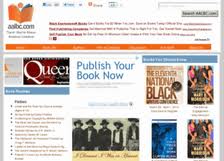 WMI: Is there a novel or non-fiction book inside of Troy Johnson? If so, what would that book be titled and what would it be about?
WMI: Is there a novel or non-fiction book inside of Troy Johnson? If so, what would that book be titled and what would it be about?
TJ: Sure; I truly believe we all have a story to tell. But more specifically I would like to produce a non-fiction book which highlights the best of AALBC.com for the first 15 years (1998 to 2013). There is so much content – especially from our discussion boards that would make compelling reading. It is a project I have been thinking about for a few years now.
WMI: What’s next for Troy Johnson? Where do you see yourself and AALBC.com three to five years from now?
TJ: The web is such a rapidly changing environment, it is really difficult to project out that far with specific goals. Today, for example, social media engagement is a big portion of what I do on a daily basis. I could never have foreseen this five years ago. My increased focus on film was launched as a result of many books being made into films, and the fact than many novelists are also screenwriters.
My biggest challenge is, and has always been, staying abreast of technology, remaining flexible enough to incorporate change, and staying true to my original mission of promoting the broad spectrum of Black literature. If I can do this while still having fun and earning a living I really can’t ask for much else. How I will continue to accomplish this in 2017? Only God knows.
Get Your Copy of Love Pour Over Me at https://www.ebookit.com/books/0000001582/Love-Pour-Over-Me.html

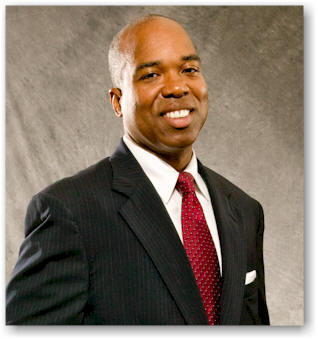
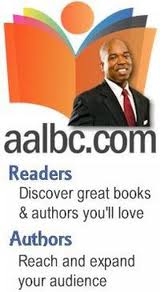
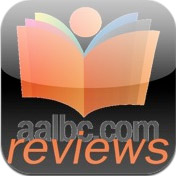
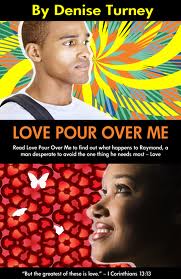


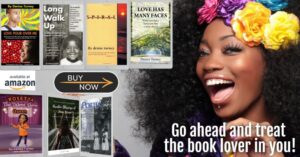
Denise, thanks for the opportunity to converse about my experiences with AALBC.com. I also read several of the other profiles here. There is so much one can learn here from the experiences of others thanks for all that you do. Peace.
AALBC covers all types of African American books and authors. Love that about the site. It’s one of my favorite book sites!
Troy Johnson is truly a literary champion! Appreciate all he does. AALBC is one of my favorite book sites too, Monica! Glad you enjoyed the interview!
I worte a groundbreaking historical novel called Walk in Bethel. I would like to send you a complimentary copy for your review and perusal, with the expectation that your endoresement will boos both interst and sales.
I look forward to hearing from you.
Sincerely,
Rose Mary Stiffin, PhD